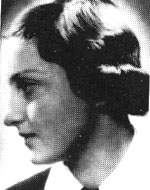Daughter of Katherine and Bella. She was born on July 17, 1921 in Budapest, Hungary to an assimilated family. Her father was a well-known writer in his country, and even though he died at an early age, his character influenced her all her life. She attended a Hungarian school where she was always among the best students. She read extensively and studied piano, and also engaged in social, cultural and sports activities. At a young age, she began to keep a journal that had over the years been one of her most outstanding virtues. On December 7, 1938, she wrote in her diary: “I do not know if I have already told you that I am a Zionist … I am well aware that this is the only solution to the Jewish problem and that the wonderful enterprise in Eretz Israel is not unthinkable. Hebrew, to read a lot about Judaism, Zionism and the Land of Israel and joined the Zionist youth movement. After completing her matriculation exams, she immigrated to Eretz Israel and arrived in Palestine in September 1939. She entered the agricultural school in Nahalal and, after completing her studies, joined the “Sdot Yam” group in Caesarea. It was clear that her members in the group were soon in charge of her personality and talents, giving her confidence and choice for responsible and central roles. On January 8, 1943, at the height of the Second World War, she suddenly wrote in her diary: “There was a week that shocked me, and I had a sudden idea that I had to go to Hungary, to be there now. Two weeks later, she was given the opportunity to join a group organized to save Jews from Europe. In November 1943 she was sent to a course by radio and in January 1944 she underwent a parachuting course. After weeks of intensive preparations, she arrived in Cairo in January 1944. And in March 1944 she flew with the group to Bari, Italy. The main aim of the paratroopers, who set out as British officers, was to reach their countries of origin in Europe, to organize the Jews there to immigrate to Israel, and to try to save as many Jews as possible. Two days after arriving in Italy, Hannah continued her journey and fell with her friends at the Lev of the enemy forces, into an “island” of the Yugoslav partisans, where she had wobbled about three months, eagerly awaiting the first opportunity to move to Hungary. The invasion of the Germans on March 19, 1944 made it even more difficult for the plan to infiltrate into Hungary, but “as if the earth burned under its feet. On June 9, 1944, Hannah secretly crossed the border and was caught in the village on the border. She was taken to prison and charged with espionage. She was tortured in jail trying to save her from the secret signal of her radio transmitter, but she did not reveal anything. Once she tried to commit suicide and was twice as successful. Her worst experience was when she was brought to a prison in Budapest and placed in a small room where to her amazement she found her mother. The Fascists threatened Hannah that if she did not reveal her secret, her mother would be tortured and executed, but she stood stiffly. The mother and daughter were put into the same prison where some of Hannah’s partners had been sent, and Hannah would encourage them with her hand-made gifts and “correspondence” through her window. When the Germans took over the Hungarian government, the mother was released and Hannah was deportedAnd moved to another prison. On October 28, 1944, she began a trial in which she admitted that she had come to rescue Jews and had harshly insulted the judges. On the 7th of Cheshvan 5707 (7 November 1944), she was transferred to another prison and brought there to the death row. An officer from the prison, who entered her cell, informed her that she was about to be executed and offered her a pardon, but she refused and demanded an appeal. Her request was not honored. At 10 am she was taken to the prison courtyard, to the corner of the small church in the courtyard. There was no last honor for the executioners. When she stood in front of the shooting soldiers, she refused to cover her eyes. After her death, she was buried in the Jewish cemetery in Budapest, not far from her father’s grave. After a while, Chana’s mother received a note written by her daughter a few days before the execution: “My beloved mother, I can only tell you: millions of thanks, and I beg you to ask if you can … – Your daughter. ” On the 16th of Adar 5706 (16.3.1950), six years after her death, she was laid to rest in the military cemetery on Mount Herzl in Jerusalem. At Hannah’s home in Sdot Yam, in Caesarea, paratroopers dropped parchments and put flowers on her coffin. Prime Minister David son of-Gurion, members of Hannah and the heads of the nation, laid wreaths on her grave. Chana left behind her a diary and other writings, including the book “Without Language.” Among her most popular songs – “Simcha Blessings,” which she wrote in Yugoslavia near Hungary last time, and was popular with lovers of poetry in Israel. It is also composed, sung and sung by many. The most beloved song is “Walking to Caesarea” (“Eli, never ending”), which she wrote in Caesarea in 1942 and was composed by David Zehavi. She assumed a mother and a brother.
